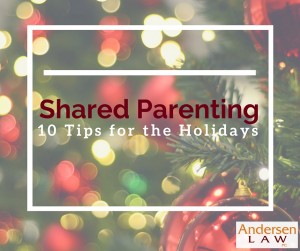
Over the river and through the woods takes on a new meaning when a judge must decide whether to grandmother’s house you go.
Judges may cringe as the holidays approach, knowing parents will be rushing into court with “emergencies” involving out of state travel, pre-purchased plane tickets and disagreements over the interpretation of parenting plans. It is not unheard of for a judge to hold a phone conference or issue an order regarding whether a trip is allowed and where the children will spend their holiday time. But it is also common for judges to determine that this is not an appropriate “emergency” requiring a forthwith-emergency order. Married parents do not get to call in an officer of the court every time they cannot agree whether the children should visit dad’s parents or mom’s parents. It stands to reason that divorced parents, or those who formed a parenting plan after an allocation of parental responsibilities, should not be able to rush to court either.
The bottom line is that no one should want a judge to determine their holiday plans. I would like to say no one “wants this” rather than “no one SHOULD want this” but I have practiced long enough to know there are a few parents out there who relish in the drama of court proceedings and cannot wait for the next “emergency” battle. For those of us who do NOT think an emergency trip to court or mediation makes a good holiday tradition, the following are some co-parenting tips to squash some of the drama before it happens.
1. Have a clear-cut parenting plan and stick to it. If you take the time to spell out traditions, then there is less gray area and less fighting. Spell out each holiday, including days and times of exchanges and deadlines for giving notice about travel. Clarity is good. Certainty is good. Stick with black and white consistency above convenience. Families who get in the habit of doing whatever they want at the time without confirming the changes in writing run into trouble later. Eventually, chaos takes over and there is no longer a clear “plan.” The courts, meanwhile, will usually default to the written plan. You should too. Any variation should be confirmed in writing and that writing should be consistent with the requirements of your separation agreement and parenting plan. Knowledgeable attorneys can help make sure the plan will work. We see hundreds of these plans and can help you avoid common mistakes and problems.
2. File parenting plans with the court. Many parents do not take the time to do this. They are later surprised when they are not able to get relief because the most recent plan filed with the court is out of date or, worse, nothing was ever filed with the court. It is tragic when a parent comes into my office because another parent pulled a fast one, whisking the kids off on an unauthorized holiday without consent or even refusing to return the children because there is no court ordered parenting plan to prevent it. What might otherwise be a prompt court order becomes a delayed hearing and, sadly, delayed time with the kids. (By the way, the parent trying to pull a fast one usually loses in the long term, so don’t try this at home — ever!).
3. Correspond through civil writing. NEVER write a text or email to the other parent that you do not want to read aloud yourself in a courtroom full of people. I have asked opposing parties to do this. A string of insults and F-bombs is just not much fun to say into a microphone, wearing your business clothes, in the light of day with your ex-spouse inwardly laughing, the cross-examining lawyer haughtily smirking, and the judge frowning from on high. Do NOT hit send if you are not 100 percent sure it is civil. When in doubt, get input on the level of civility from someone objective (and, by the way, your mom and your significant other who thinks the other parent gets away with murder are not objective). Do NOT hit send if you are angry. Do NOT hit send if you just had a drink or two. Write texts and emails to the other parent as if you are writing them to your strictest English teacher, your grandmother, the children’s teacher, the Pope, Ghandi, Mother Theresa, Oprah, Santa and the judge all in one. This goes for voicemails and even phone and in-person conversations too. Recording has gotten out of control. I generally don’t condone it, but be prepared.
4. Plan ahead. It helps to iron out Christmas before Dec. 21, for example. Start planning and communicating early if you intend to vary the parenting plan or if there is a gray area to be clarified.
5. Ask before you buy. Do not run out and buy half-price cruise tickets or plane tickets to Honolulu during your ex’s parenting time and then think you can use them as an excuse to vary the parenting plan. If you do not have travel insurance, well, the court may just shrug and let you suffer. The judge may have just had a case involving an impoverished parent whose child needs emergency life-saving surgery and may not think your self-created “emergency” is the greatest tragedy of all time.
6. Share the holidays. If you are the primary residential custodial parent and the other parent’s parenting time is not restricted in a very clear way or for solid grounds affecting the children’s mental or physical welfare, have a heart and encourage your children to spend some time with the other parent during the holidays. If you do not do this, you are Scrooge. Not just maybe Scrooge. Scrooge for sure. And get your head around this: when your children do not spend holidays with the other parent and are cut off from their cousins and grandparents and extended family too, the whole world is not impressed. People are not saying, “Gosh, it turns out that other parent really is a huge loser after all. I now realize that the one parent WON the divorce because the kids are spending all their holidays at that person’s house.” No, in truth, the whole world is not watching at all. The world does not care all that much and knows that there are not clear winners in divorce.
The real losers are the children who feel guilty if they visit a parent and then are punished for it with prying questions or judgmental sighs of disapproval. Here is another lousy excuse for not sharing the kids: they don’t want to go. Hmmm, if they do not want to go to school, do you just let them stay home? No, because that would not give you that smirky “I won” feeling you get when they align with you and don’t like the person you don’t like — i.e. your ex. Please put aside these feelings and let children visit the other family unless, as stated above, their mental or physical welfare will clearly be impaired. It is hard, I know. But it is called being a grown-up or, in legal terms, the ability to put the children’s needs above your own. The law explicitly requires that level of self-sacrifice, because it IS in the best interests of your children.
7. Be flexible about days and times. Yes, be certain and clear and stick with written plans (see #1 above), but when it comes to forming plans, consider that a date on the calendar may not be the end of the world. Just because Aunt Lulu always slices the fruitcake at 7 p.m. sharp on Dec. 24 does not make this event a nationally recognized holiday that every court in the world must respect each year without fail. Maybe the kids can miss fruitcake with Lulu every other year as part of the parenting plan. Or maybe, just maybe, some gifts can be opened on Dec. 25 or (gasp!) Dec. 26 every other year as part of something we grown-ups like to call “compromise.”
8. Do not involve the children in litigation or negotiations. Here are some things that, if your children have said them, mark you as a bad parent. “The new judge on the case is not a very good judge and that is why everything is messed up with holidays and parenting time.” “Mom won in court this Thanksgiving but dad won last time.” “My parent is going to file our holiday parenting plan with the court as soon as I am done writing it.” Litigation is not age appropriate information. The children just need to know that the adults are taking care of business, that it will be fair — or close to it — and that the children’s needs will come first. And by the children’s needs, I mean their need to have fun, celebrate, whine, complain, play too many video games, stare at their phones too much, roll their eyes, eat too much sugar, not get everything they want, say that everyone else gets what they want and you are the worst parent in the world, laugh, fight with their siblings, band together with their siblings, join in the true wonder that makes holidays a magical time for every child whether their parents are together or not. It’s called making memories and it is nice if they involve cookies and sleigh rides, not injunctions and forthwith motions.
9. Have fun. Sometimes parenting issues simply, for lack of a better term, suck. Just because your significant other and you divorced or broke up does not mean your life must be endless torture ad infinitum. Okay, maybe court proceedings in a family law case are a close facsimile to one of Dante’s rings, but LIFE itself should be fun. Even if you have a permanent orders hearing on Dec. 26 or on the last day of Chanukah or on Festivus, do not despair, you have permission to make the best of it and enjoy the holiday the best you can. Even if your children are away for the entire holiday with Scrooge or Mrs. Scrooge and the extended family of Scrooges. Even then, pop the champagne, find a friend and toast in the holiday. It’s okay to enjoy yourself. I have yet to see a single provision in the family code that says the injustices of family law and hardships of joint parenting require 24/7 frowning and bah humbug. Being happy sets a good example for the kids, and helps you get through the hard times with dignity and style. It is one of the few things divorced parents ARE allowed to do and yet the main thing they are afraid to do. It’s possible that there may be some guilt, but I find it actually helps the case if the parent can manage some self care, positivity and, ideally, joy.
10. Fake it till you make it. If you can’t have fun, fake it for the children’s sake. Parents do this all the time and you can too. Your children may pick up on it, but then again, they may not. You know what they call a parent whose heart is broken and yet who goes out to chop down a Christmas tree with a fake smile pasted on his or her face and even throws in a kind word about the very person who broke that heart as feeble attempt at goodwill? They call that person a good parent! They don’t give out awards for that kind of behavior. But as a divorce attorney, I meet people who do this sort of thing every day. For what it’s worth, I am watching and I think you are among the world’s heroes.
Now go get ’em, you supermoms and superdads. Happy holidays!
